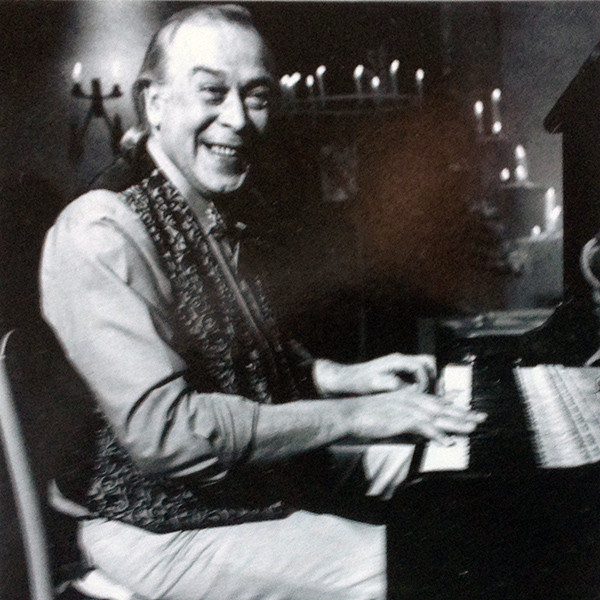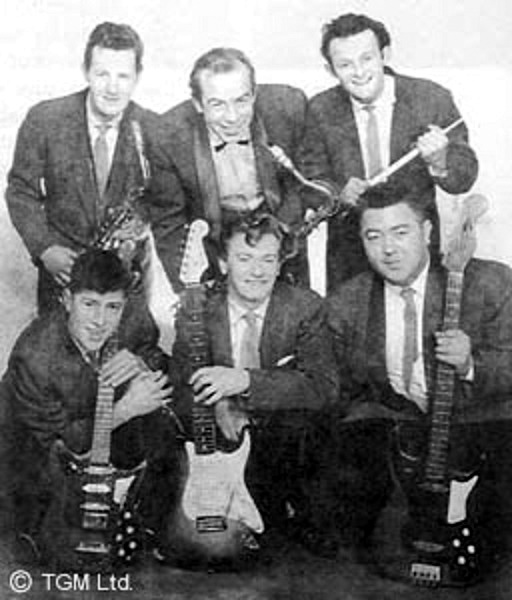I’m sure I’ve said it before, but I’ll say it again anyway: the true joy of vinyl is not so much having some superlative sonic experience, but discovering obscure artists and albums that will never find their way onto streaming services (or even a CD). There may be snippets of them on YouTube, uploaded years ago by some anorak, but finding them without already knowing them is improbable at best. I’m talking about stuff like Count Basie’s Beatles cover album (Basie’s Beatle Bag, 1966), Louis Jordan’s jump blues collab with the Chris Barber Band (Louis Jordan Swings!, 1976), and the entire discography of one Tommy Burton and his Sporting House Quartet.
“Who?” Why, only Britain’s own answer to Fats Waller—and one of the most in-demand musical entertainers of the 1970s, apparently. In a career spanning half a century he played festivals all across the UK and sold out London’s iconic 100 Club nine New Year’s Eves in a row, as well as having a regular spot on BBC television. Yet I had no knowledge of the singer, pianist, saxophonist, and guitarist until stumbling upon one of his records during a rainy afternoon of crate digging. Chances are you’ve never heard of him either, as there’s very little evidence of his five-decade career online. So allow me to introduce Tommy and the musical legacy he left, still floating around the second-hand record stores and eBay backwaters.
Born in 1935, Thomas William “Tommy” Burton grew up in the town of Bilston, near to—and since absorbed by—Wolverhampton, in a part of England’s West Midlands known as the Black Country. (The region’s very distinctive accent, which is a lazier-sounding version of Birmingham’s Brummie accent, would become something of a Tommy trademark—only not while singing.) He took up piano lessons aged eight and, after first encountering jazz in Birmingham at the age of 15, added clarinet and saxophone to his skillset.

Within a year he was playing professionally: his first gig was as sideman to Pete Young and his Chitterling Twisters, in the flatbed of a truck at Bilston Carnival. In 1953 the 18-year-old Burton was conscripted into the RAF, under the UK’s post-war National Service program. He led several dance bands during his five-year military stint, as well as forming the short-lived Thunderfoot Burton’s Celestial Three and getting his first national radio airtime, with legendary trad trumpeter and BBC broadcaster Humphrey Lyttelton.
For a time Burton rode the rock ’n’ roll bandwagon, first fronting the Ravemen and then the Tommy Burton Combo, playing guitar and sax respectively. But he returned to jazz with gusto during the 1970s, resuming his seat at the piano and becoming Britain’s top Fats Waller wannabe. Now, I use that word reluctantly because of the negative connotations it carries, but it’s difficult to know how to describe Burton’s act: He played in the Harlem stride style, as have many musicians since, incorporating a lot of Waller’s material into his act. But he also imitated Waller’s vocal stylings—including his witty lyrical asides.
This would seem to put Burton in the tribute bracket, but he didn’t bill himself as such. In addition, Burton carried this very specific musical method over into covers of other composers as well: see, for instance, his Waller-esque take on Louis Prima’s “I Wanna Be Like You” or Louis Armstrong’s “The Skeleton in the Closet.” As such, he became a sort of couldabeen, rather than a wannabe: a fictional Waller who survived pneumonia in 1943, living past the tragically young age of 39 and continuing to perform into old age. If Burton’s work was a tribute to Waller—which it undoubtedly was, in large part—it was to the iconic entertainer’s skill, style and potential, rather than merely his music.
But, despite adopting Waller’s singing voice and vocal mannerisms, Burton was far from being a simple impersonator. In fact, he was as much the classic 1970s English club turn as he was the old-time piano professor. Like his idol, Burton employed comedy as a core part of his act—unlike him, Burton did it in his own ribald style and his own Black Country drawl. Footage of one 1993 gig shows him cracking long, bawdy jokes about blow-up dolls, outdoor lavatories and sexual health tests between tunes—to what seems like neverending peels of laughter—all while puffing on a cigar and swigging a pint of ale. He was Bernard Manning with a piano, essentially.
And yet, despite filling festival venues and dancehalls up and down the country for decades—as well as hosting a well-remembered BBC show and making regular transatlantic trips to play Fritzel’s Jazz Pub on Bourbon Street, New Orleans—the impact Burton made on jazz literature has been absolutely minimal. I spent one sunny Wednesday afternoon scouring every jazz tome in both my local library and a nearby second-hand bookstore, and Burton gets not a single mention in any of them. The most complete (if not wholly accurate) source of biographical info I could find for this feature was his 2000 obituary in national newspaper The Guardian, which he was evidently notable enough to receive.
Lyttleton dedicates the longest chapter of his 1998 book The Best of Jazz to Waller: his origins, his contribution and his legacy. But, despite being right there at the beginning of Burton’s rise to fame, Humph doesn’t give Wolverhampton’s own Waller even a passing mention. Oddly enough, Burton gets more kudos from former Slade drummer Don Powell, in his 2013 biography Look Wot I Dun. In it, Powell recalls recording with Burton, who jazzed up “Find Yourself a Rainbow” with a barrelhouse piano accompaniment. “Tommy Burton & His Combo [sic] were a big band and they did a lot of gigs,” says Don. “They attempted to capture the original rock ’n’ roll sounds of Bill Haley and others, before Tommy turned to his first love, jazz, in 1965. He was a big name [and] an amazing pianist.”

The only other mention of Burton in print, as far as I could find, was in Still A Black Country Bloke, a self-published compendium of reminiscences and regional history by one Harry Taylor. He recalls being a teenager and dancing at The Town Hall in Brierley Hill, to rock ’n’ roll bands including the Tommy Burton Combo. “They were there every week for two or three years,” Taylor writes. “It was proper rock ’n’ roll: if I close my eyes, I can still hear that tenor sax.” The author notes Burton’s piano prowess and his BBC career, describing him as “a very talented entertainer” and adding: “I feel privileged to have seen and danced to his music so many times and so many years ago.”
Perhaps this lack of press is because Burton didn’t make too many records. Rag Time was released by Windmill in 1974, after which he appeared on two discs cords with the Pete Allen Jazz Band: Jazzin’ Around in 1984 and Jazzin’ Around II the following year. Tommy Burton’s Sportinghouse Quartet Plus One appeared on Unit Records in 1985, Tonight’s My Night With Baby came out on Lost Records in 1986, and Rolling Around the World was an indie release on cassette only, in a year unknown. The tracklists are love letters to the great Jazz Age composers like Ahlert, Berlin, Caesar, De Sylva and of course Waller, but also to some of Britain’s brightest writers: Douglas Furber, Philip Braham, Jule Styne, and others.
Burton died in 2000, a few years after he suffered a stroke. Friends and fans shared personal memories on a short notice published to the Jazz & Jazz website, praising an entertainer whose impact on the British jazz scene—particularly the festival circuit—was far larger than surviving archives would have you believe. Fortunately, his musical contributions are still out there for eager crate diggers (or eBay shoppers) to enjoy. They’re well worth getting your hands on, if the output of British trad revivalists interests you. On a personal note, as a devotee of the keys and a Fats Waller superfan, I’m delighted to have discovered a UK trad piano idol who was easily the equal of his better-known contemporaries Barber, Bilk, and Ball.
Dave Doyle is a swing dancer, dance teacher, and journalist based in Gloucestershire, England. Write him at davedoylecomms@gmail.com. Find him on Twitter @DaveDoyleComms.






















